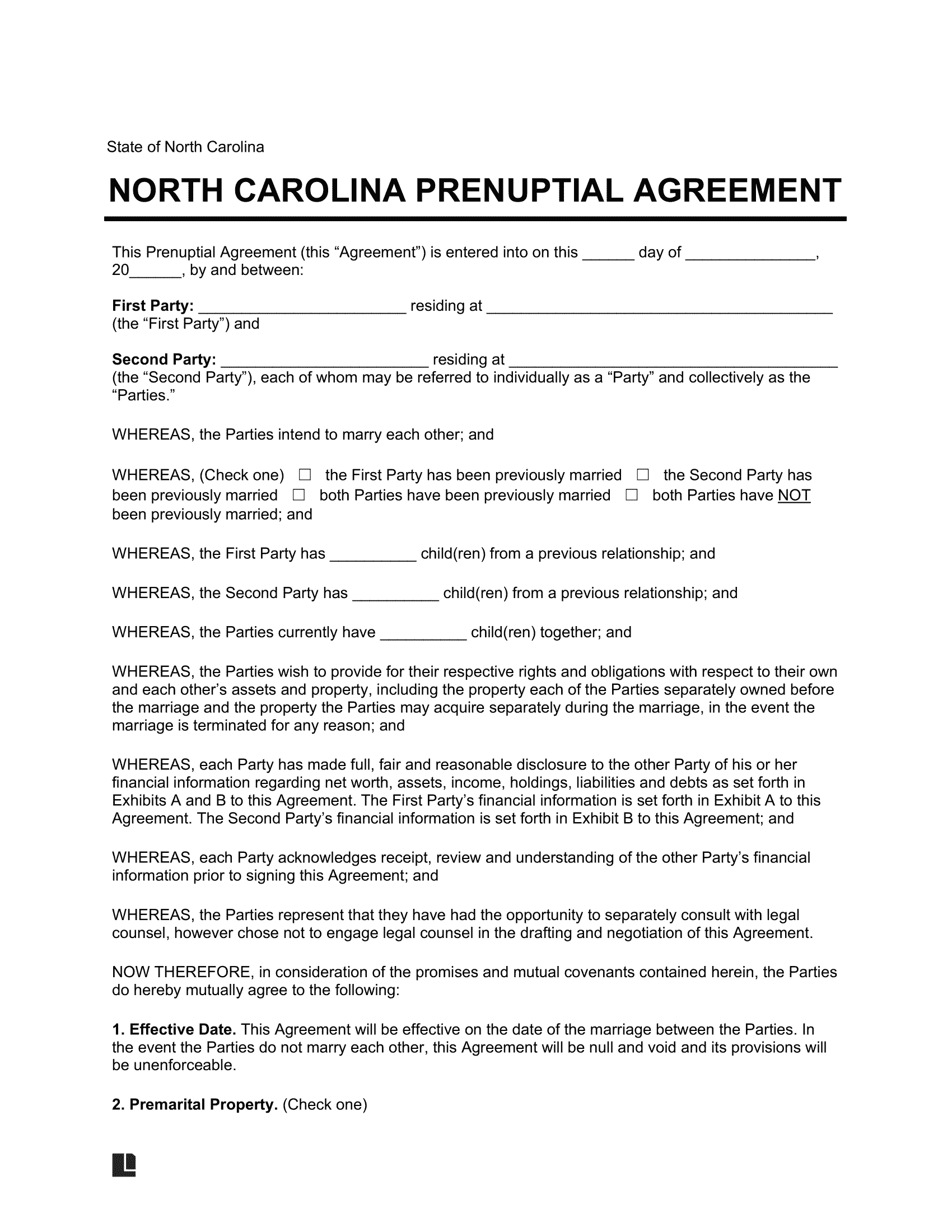What Is a North Carolina Prenuptial Agreement?
Under the North Carolina Uniform Premarital Agreement Act (NCUPAA), an engaged couple creates a prenuptial document — also known as a premarital agreement or prenup — and it becomes legally enforceable once they’re married.
You can customize a prenup to your specific needs. Generally used to make a divorce settlement agreement easier, it includes decisions on:
- Property division
- Debt allocation
- Spousal support
Similar to many other states, North Carolina has adopted its own version of the Uniform Premarital Agreement Act. You can find all regulations for premarital agreements in the North Carolina General Statutes (G.S.) Ch. 52B.
When preparing your agreement, keep in mind your state’s rules for dividing property between spouses. North Carolina follows equitable distribution, not community property, distributing assets based on each spouse’s income, lifestyle, and financial dependence during the marriage instead of an automatic 50/50 split. This means that if a judge decides who gets to keep a particular belonging, they may take into account factors including the buyer and sentimental value.
You can choose to create a similar document after you are married, known as a postnuptial agreement. However, these contracts are prone to more scrutiny from judges, as they may have been created while tensions were present within the marriage.
How to Write a Prenuptial Agreement in North Carolina
When writing a premarital agreement in North Carolina, you and your partner will agree on how to handle your assets, debt, and businesses. Then, legally document it with the following steps:
- Provide personal information: Enter both parties’ names and addresses, then identify whether either of you has children from previous partners or together.
- Disclose assets and debts: Either decide to combine your assets and debts or identify who will own which assets and be responsible for which debts during and after marriage.
- Assign business ownership: Detail businesses owned before the marriage and their ownership, then decide how to handle any companies started during the marriage.
- Discuss property division: Define how property will be divided in the event of a separation, divorce, or death. In North Carolina, you can also specify each spouse’s rights to buy, sell, use, transfer, dispose of, or otherwise manage and control property.
- Insert optional information: You can choose whether to detail how you will file taxes during the marriage (jointly or separately), how to divide your home if you divorce, and who will be responsible for which household expenses.
- Describe spousal support arrangements: Select which of you, if either, will pay spousal support if the marriage ends and for how long.
- Review and sign: Confirm that you and your partner have given fair disclosures of all relevant information, including your financial status, assets, and debt. Then, look over the agreement and sign it.
North Carolina Prenuptial Agreement Sample
Below, find a sample of our North Carolina prenuptial agreement template. Customize the template for your specific needs with our easy-to-use document editor, which guides you through a step-by-step interview to draft an agreement tailored to your situation.
Legal Requirements in North Carolina
North Carolina prenuptial agreements are governed by the NCUPAA, which specifies how to make your document enforceable in the state.
Signing
Though not necessary, getting a North Carolina notary acknowledgement can help prove that both parties signed a premarital agreement willingly. Both parties must sign the prenup and it must be in writing, as per NC Gen Stat § 52B-3.
Enforceability
As per NC Gen Stat § 52B-7, a prenup is enforceable unless one party can prove:
- They did not sign voluntarily.
- The agreement was unconscionable at the time it was executed and there was a lack of financial disclosure and the right to disclosure was not waived.
If the marriage is void, the prenup applies only to prevent unfair results, as outlined in NC Gen Stat § 52B-8.
Attorney Representation
You don’t have to use an attorney to create a legal prenuptial agreement, as per NC Gen Stat § 52B-7. However, having each party go through the process with their own legal representation promotes fairness in the final arrangement, and can help ensure that the agreement holds up to a later challenge/
Spousal Support Waivers
Either party may waive their right to alimony in the prenup.
Modifications
You may amend or revoke your prenup after marriage with a new written agreement signed by both parties, as outlined in NC Gen Stat § 52B-6.
Other Considerations
You may add any other clauses about personal rights and obligations to your agreement so long as you do not violate public policy or a statute that carries a criminal penalty, as per NC Gen Stat § 52B-4.

